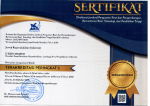THE PROBLEMS OF INDONESIAN MIGRANT WORKERS' RIGHTS PROTECTION IN MALAYSIA
Abstract
This paper describes the poor state of protection of Indonesian Migrant Workers Rights in almost all economic sectors, both formal and non-formal, in Malaysia. In this research, most of the randomly interviewed respondents were Indonesian Migrant Workers (TKI) with a few Philipinos, Indians and Vietnamese employed in various sectors such as domestic work, manufacturing, plantations, construction, or retail (stores and cafes). Many of the TKI living and working in Malaysia did not receive their full rights as workers and sometimes even lost their basic rights such as that to_a minimum wage, not being not having their wages withheld or not paid at all their withhelds, as well as a refusal to have their passports returned. Many of the Indonesian workers were physically and sexually abused by their employers. For example, some Indonesian workers employed in the plantation and construction sectors had to stay in very poor accommodation while many female workers were victimized into becoming forced prostitutes by their sponsors. In addition, some of the TKI had to face serious problems of protection; many as vic~ of corrupt practices such as the imposition of illegal levies by Malaysian olice and immigration staffs suffered by the TKI were demands for payments; extortion of money and confiscation of valuables factors contributing to the vulnerability of Indonesian migrant workers such as: a) Low formal education and lack of relevant training; b )Lack of information on how to obtain travel documents, how to apply for jobs or visas and how much to pay in fees; c) Lack of knowledge or understanding of the labour law and immigration regulations of Malaysia as the receiving country; d) Falsifying ofiD Cards, data of passports and other travel documents in the recruitment and deployment process by recruiting agents and involving immigration officials.
Keywords: Indonesian migrant workers, Malaysia
Keywords
Full Text:
PDFReferences
Asis, Maruja M.B. (2005). Preparing To Work Abroad: Filipino Experiences Prior to Deployment. New Manila: Philippine Migrants Rights Watch, Manila.
Fernandez, Irene (Ed.). (2002). Migrant Workers: Access Denied. Kuala Lumpur: Tenaganita SDN.BHD.
Fernandez, Irene. (Ed.). (2002). A Report of National Consultation on Foreign Domestic Workers in Malaysia. Kuala Lumpur: Tenaganita SDN.
BHD. Gob, Chen Chuan. (2004). Guide to the Employment Act and Labour Laws of Malaysia, Petaling Jaya: Leeds Publication.
Hugo, Graeme. (1993). "Indonesian Labour Migration to Malaysia: Trends and Policy Implication". Southeast Asia11 Journal of Social Science, Singapore, 21 (1).
Jones, Sidney. (2000). Making Money off Migrants: The Indonesian Exodus to Malaysia, Hong Kong: Asia 2000 Ltd. and Centre for Asia Pacific Social Transfonnation Studies, University of Wollongong, Wollongong.
Mackenzie, Caroline. (2005). Labour Migration in Asia: Protection of Migrant Workers, Support Services and Enhancing Development Benefits. 10M (International Organization for Migration), Geneva.
Malaysia, Department of Occupational Safety and Health - Ministry of Human Resources. (2004). Guidelines on Gender in Occupational Safety and Health.
Malaysia, Department of Occupational Safety and Health - Ministry of Human Resources. (2003). Guidelines on Occupational Safety and Health in Agriculture.
Malaysia, Department of Statistics. (2003). Labour Force Survey Report.
Malaysia, Department of Statistics. (2004). Malaysia Economic Statistics- 1ime Series.
Malaysia, Legal Research Board. (2003). Employees Provident Fund Act 1991 (Act 452) and Regulations and Rules. Petaling Jaya: International Law Book Services.
Malaysia, Legal Research Board. (2004). Akta Pampasan Pekerja 1952 (Akta 273). Petaling Jaya: International Law Book Services.
Malaysia, Legal Research Board. (2005). Employment Act 1955 (Act 265)and Regulations and Order. Petaling Jaya: International Law Book Services.
Malaysia, Legal Research Board. (2000). Akta Hari Kelepasan Mingguan 1950 (Akta 220) dan Akta Hari Kelepasan 1951 (Akta 3). Petaling Jaya: International Law Book Services.
Malaysia, Legal Research Board. (2003). Workers 'Minimum Standards of Housing and Amenities Act 1990 (Act 44). Petaling Jaya: International Law Book Services.
Malaysia, Legal Research Board. (2004). Industrial Relations Act 1967 (Act 17) and Rules and Regulations. Petaling Jaya: International Law Book Services.
Malaysia, Legal Research Board. (2002). Employment (Restriction) Act 1968 (Act 353). Petaling Jaya: International Law Book Services.
Malaysia, Legal Research Board. (2004). Immigration Act 1959163 (Act 1 55) and Regulation and Orders and Passport Act 1966 (Act 150). Petaling Jaya: International Law Book Services.
Malaysia, Legal Research Board. (2004). Workmen s Compensation Act 1952 (Act 273) and Regulation and Orders. Petaling Jaya: International Law Book Services.
Malaysia, Legal Research Board. (2005). Trade Union Act 1959 (Act 2622) and Regulations. Petaling Jaya: International Law Book Services.
Malaysia, Legal Research Board. (2002). Children and Young Persons (Employment) Act 1966 (Act 350). Petaling Jaya: International Law Book Services.
Malaysia, Legal Research Board. (2003). Employees' Social Security Act 1969 (Act 4) and Regulation and Rules. Petaling Jaya: International Law Book Services.
Malaysia, Legal Research Board. (2005). Occupational Safety and Health Act and Regulation. Kuala Lumpur: MDC Publishers SDN. BHD.
Malaysia, Legal Research Board. (2005). Factories and Machinery Act with Regulations. Kuala Lumpur: MDC Publishers SDN.BHD.
Malaysia, National Institute of Occupational Safety and Health. (2004). Annual Report.
Nuqui, Carmelita G and Noel L. Jesue. (2000). A Critical Assessment of the Migrant Workers and Overseas Filipinos Act of 1995. Manila: DAWN-Phil.
Rajikumar, K. (2001). Malaysian Labour Laws, Made Simple. Subang Jaya: Pelanduk Publications.
Romdiati, Haning, Mita Noveria, and Suko Bandiyono (Eds.). (2002). Kebutuhan lnformasi Bagi Tenaga Kerja Migran Indonesia: Studi Kasus di Provinsi Jawa Barat, Kalimantan Tzmur dan Riau. Jakarta: Pusat Penelitian Kependududkan, Lembaga llmu Pengetahuan Indonesia (PPK - LIPI).
DOI: https://doi.org/10.14203/jki.v2i1.139
Copyright (c) 2007 Jurnal Kependudukan Indonesia

This work is licensed under a Creative Commons Attribution-NonCommercial-ShareAlike 4.0 International License.
-----------------------------------------------------------------------------------------------------------------------------
Research Center for Population, Indonesian Institute of Sciences
Widya Graha Building, 7th and 10th floors
Jl. Jenderal Gatot Subroto 10 Jakarta Selatan, Telp (021) 5221687
Website: http:/kependudukan.lipi.go.id;
E-Journal: http://ejurnal.kependudukan.lipi.go.id
Pustaka: http://pustaka.kependudukan.lipi.go.id
-----------------------------------------------------------------------------------------------------------------------------








